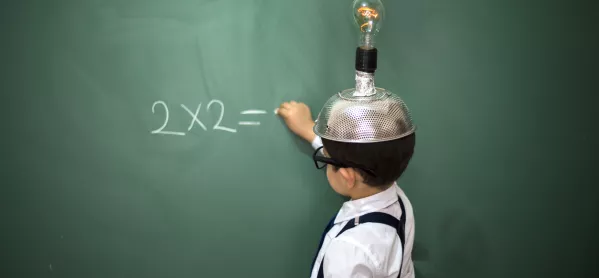- Home
- ‘I emerged from maths GCSE as if I’d run a marathon’
‘I emerged from maths GCSE as if I’d run a marathon’

The dreams keep coming, even though the events are over.
I am being unexpectedly led into a room, and when I sit down everyone else is prepared and knows why are there, but I do not. Or, in another version, I start the day at a desk that is stacked with papers I cannot decipher.
I wake up with a start. It’s OK: the exams are over. I’m just waiting for the results.
I will wake up on Thursday at around 7am and log in to find the results of my mathematics foundation-level GCSE. No collecting envelopes for me. Apparently my performance will be broken down by paper and by topic, so that I can see the areas I need to work on should the unmentionable happen and I have to return to the exam room in November.
I need to pass to get on a teaching course. Indeed, it is a now requirement for many teaching-assistant positions, as Tes readers will know.
Tackling maths GCSE
It will be the culmination of an 18-month effort. First I self-studied, in order to prepare for an entrance test last September. This determined whether I was a higher, foundation or not GCSE-worthy candidate at all. Then our weekly three-hour classes began, along with the homework (sorry, “home learning”): endless YouTube videos to watch, and past-paper questions to tackle.
Thursday will also be the end (hopefully, for now) of a tricky relationship with numbers, spanning 40-plus years, and taking in fear of numbers and a lack of confidence in tackling numbers. Sure, I’ve spent a career looking at budgets, spreadsheeting expenditures and tracking costs for the finance department to approve. Sure, I’ve been able to spot when a graph in a newspaper or a set of stats has been manipulated in some way to make a more dramatic impact. But deep within has been the sense that this is not backed up with that most basic of qualifications.
My secondary school insisted that I retake maths O level when I was ungraded at my first attempt. I rewarded their faith by doing absolutely no work and dumped another U grade on them in the November. They made me sit a CSE, in which I achieved a grade 3. When I didn’t understand a topic first time of asking, I didn’t bother with the subject at all. I was a words person and that was that.
Wall of letters
Something of this returned this January when, after a successful autumn term, we tackled that wall of letters called algebra. For a couple of weeks, I was just as lost as I was all those years ago. I was busking it in class, and I might even have skipped on home learning. However, another, more doable topic came along and when revision started it all made a bit more sense.
Those topics do come along at a pace. Until 2017, the GCSE maths syllabus was taught at London’s City Lit, where I studied, every Tuesday, and would be completed by March, so that revision could begin. For the past three years, additional three-hour monthly Friday classes have supplemented Tuesdays to accommodate the Govean additions to the syllabus, along with several Saturday revision sessions at the end. Revision doesn’t begin until April, the month before the exams. I would love to hear how secondary schools are coping with this. You have to admire them.
Hats off also to today’s 16-year-olds. After a sleepless night ahead of our first non-calculator paper, I emerged from the exam room staggering as if after a marathon, from the sheer adrenaline drain. I have never been so mentally exhausted. I know that many teenagers up and down the country had their first geography paper that afternoon and, of course, multiple papers in their other six or seven or more subjects to sit, too.
Whatever the result on Thursday, my relationship with numbers is fundamentally changed. I will probably never have to solve a simultaneous equation again. But the fact that I know that I can is of immense comfort. Thanks to some brilliant exposition in the classroom, I can see the beauty of numbers, shapes and their properties.
I will never be a numbers person, but I am a more numerate person. It’s all been a bit of an education.
David Hall is applying to become a teacher. For 25 years, he worked in communications for a range of clients. He tweets @campdavid
Keep reading for just £1 per month
You've reached your limit of free articles this month. Subscribe for £1 per month for three months and get:
- Unlimited access to all Tes magazine content
- Exclusive subscriber-only stories
- Award-winning email newsletters



